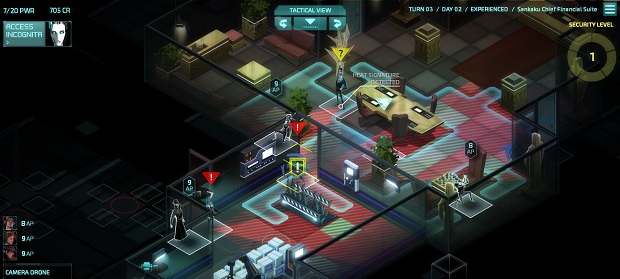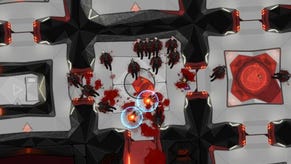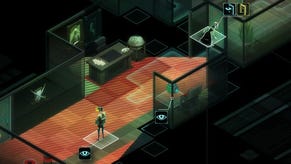The RPS Verdict: Invisible, Inc.
Incredible, Inc.
Adam: Invisible, Inc. [official site] is a turn-based stealth game and there is absolutely no reason why turn-based stealth should be a thing that works as well as this does. It is also has procedurally generated tactical cyberpunk environments, which should be occasionally confusing and a pain in the backside but are almost always indistinguishable from hand-crafted puzzles latent with drama and tension.
It's both our Game of the Month and my favourite game since Crusader Kings II! What do we all think?
Alec: I haven’t played much of the final version yet, but one of the last early access builds was already my favourite XCOMlike since XCOM. It’s an engine for tiny dramas. And it just seems so effortless, as though stealth-based turn-based strategy with just a couple of characters has always been a thing.
I’ve been playing Massive Chalice recently too, and there’s this almighty difference in terms of excitement. In Invisible Inc you always feel like something unbearably thrilling is about to happen, and that there’s a whole bunch of stuff you could potentially do to resolve it, whereas MC feels so stilted and robotic. I don’t know what Klei’s mojo is, but it’s mega-mojo.
Pip:: I've done the tutorial and the first mission but I'm starting to feel excited. I tend to find turn based stuff lacks tension – games in this vein can feel like there's a correct answer and not much room for improvisation but with this I'm feeling a lot free-er. It's not forgiving, but there's room to play, if that makes sense?
Adam: Yes, that makes sense. The one-hit permadeaths and constant rise of the alarm suggest it’s going to be absolutely punishing, but there are solutions to almost every problem. Right from the start, it lays out its cards - you’re outnumbered, outgunned and plain out of chances. So the fact that the entire game is ABOUT grabbing the second (or hundredth) chance that you really probably didn’t see coming is really exhilerating.
If a game like Just Cause is basically the last ten minutes of every action movie (or the entirety of Mad Max: Fury Road), Invisible, Inc is the equivalent for heists or espionage. Because it begins at the end, so to speak, with the agency fighting for their lives, there’s a constant sense of escalation rather than the slow-build and preparation. You prepare as you go, in the level, in the moment. Augmenting agents using a hacked surgical machine while there are guards patrolling just beyond the door.
Pip: It makes it so easy to imagine the exchanges the agents might be having, too. In the first mission I had a level with two possible branches towards the escape so the agents split up. Decker found the way out and bashed a guard on the head to knock him out in order to get past safely, then waited for Internationale. She was a fair bit behind and with no way to get through the door without the guard coming round again so I had Decker wait nearby to cosh him again as she hid behind a computer terminal. It was a simple sequence of actions but at the end, when they walked to the lift, I still imagined them having one of those jokey one-liner exchanges about it.
Alec: It has urgency, is the thing. That’s not something which a turn-based game naturally has - you feel you can stop and think, take your time, even undo an error. But the combination of theme and no reloads means you feel like you have to act now or your agent’s doomed. I sort of forget that it’s turn-based, because it plays out like this manic, one-take action sequence - darting back and forth behind the same doors, waiting for guards to walk by, praying that you’ve got enough movement points to get to your mate’s prone body and revive them. And every decision feels like yours, rather than the obvious thing you had to do.
Pip: I think the urgency is because there are lots of little moments for tension within the level. There are doors into new rooms with goodness knows what security arrangements which you'll reach almost every turn, then there are the guards and their patrols and their KO timers so you have to factor them in, and then the objectives and the security which, as Adam says, is ramping up all the time. You get to think about each move but in almost every move there's something that can go wrong or that you have to deal with immediately. I prefer that approach to games where you spend multiple turns setting up to do one particular thing. I find them frustrating because I might well have buggered up on the second move but then made seven more before realising I'd been screwed all along. Here it seems to be more of a cascade of "oh shit! not over there!"
Adam: I hadn’t really thought about the way things cascade but that’s definitely true. Plans are often made in a split-second and then executed in the next. It’s very malleable and allows for all kinds of daring improvisation. What’s even more impressive is that it manages to allow that kind of expression and reactive play in these super compact chambers. The whole game is an exercise in managing mechanics within a tight structure - both the campaign and the individual missions. Everything is very intentionally and deliberately restricted - with time limits, cash limits, action point limits, carry weight limits, equipment charges and cool-downs - and the whole campaign is a ticking timebomb that you have to defuse. It’s all risk-reward balance to an extent, except the reward is usually going to raise your chances of survival by the slightest degree rather than making you into a total badass with a +70 cyberrig.
Alec: No, you’re a ticking timebomb. We all know it.
Adam: I do have a +70 cyberrig (it’s a digital watch).
Alec: I can send text messages from my watch. I’ll out-hack you any day. And out-dork you.
Anyway, one thing that always gets me about Invisible Inc is how much personality I project onto the guards. The simple fact of someone’s route taking them through exactly where I want to go, or that this guy I keep having to zap into unconsciousness is this beating heart of known danger, means they mean something to me, somehow. I guess it’s because they don’t often die, unless you’re being super-reckless: they remain persistent threats, and you have a very clear idea of what the threat is: where you can and can’t go, how many times you’ve had to zap them, the little anecdote involved in escaping from them. I almost feel sad when I leave a level, like I’ve got unfinished business with these guys.
Is there anything anyone doesn’t like about it, or are we all breathless enthusiasts who are betraying the necessary cynicism of our trade?
Adam: Well, in the tradition of innovative turn-based tactical games it’s charms are obscured at times by hideous graphics and a crappy UI.
OH NO WAIT IT LOOKS FUCKING AMAZING.
Look, I even like the voices. I’ve fallen for it hard. I’m also kind of surprised that I didn’t expect it to be anywhere near this good because Klei have been on fire recently. Mark of the Ninja wasn’t to everybody’s taste, I know, but it switched stealth into a side-scrolling proposition seemingly effortlessly. Obviously there was actually a great deal of effort and work involved.
One thing they have in common is what I’ll call the Freedom of Information Act. The interface in both games is willing to give you all the information you need to make your next move - like a chessboard - and that’s so different to many other games, and any game that uses dice rolls. In XCOM, so much of the tension comes from not knowing if a shot will hit its target or if a wound will down an agent. Invisible, Inc. tells you exactly what is going to happen before it happens but still manages to surprise you. That’s incredible.
It feels like a polished and perfected version of a design that already existed somewhere. I don’t think it did exist though - if it did, I haven’t seen it before. That’s not to say there’s something unique about the setting or the basics of the design. But it’s extremely rare to come across a game in which all of the details of that design intertwine so effectively. And then you realise it lets you redefine a lot of the parameters individually instead of having monolithic difficulty levels and, wow.
Pip. Say something negative about Invisible, Inc. so that I can DEFY you.
Pip: Okay, the only thing that I found a little odd was the rewind mechanic. I mentioned this to you OUTSIDE the hallowed verdict chamber so I will reiterate: basically, the rewind takes you back a turn but when I did make a mistake it wasn't a turn-worth of mistake, it was that I wanted to rewind some of the action or movement points I'd spent. Thus, rewinding felt more punishing or immersion-breaking than I initially thought it would be. That's part of the game, obviously, but I'm trying to work out whether or not it would be good to be able to choose whether you use a rewind on a HUGE WHOLE TURN or on just a small bit of a turn.
Adam: As you play more, I reckon you’ll find that you only really use rewinds when an agent is taken down. I think it quite naturally becomes a last resort tool, even when you’re playing on regular difficulty and have a handful to burn on each mission. If it were an undo button for your last ‘move’ rather than turn, it’d be too useful.
Alec Yeah - I mean, half the joy of it is trying to bounce back from a mistake (which is how I most enjoy Hitman games too, the desperate fumbling to find safety once everyone knows you’re there). You want to save those rewinds for when the situation is entirely irredeemable.
The only thing I’m not totally sure about is the metagame timer structure, I feel a bit pushed before I’m ready. But equally I’m sure that’s part of why it has urgency and doesn’t feel like a grind - you have to keep moving forwards, can’t regret that you haven’t unlocked this or that, can’t dodge going on harder missions. It keeps turning up the heat. But it does make me feel a little panicky, this worry that maybe I did do something wrong three missions ago or haven’t banked enough cash, and I’m going to suffer for it later.
Adam: There is an endless mode but I find it difficult to stick with mission after mission without an endgoal. It is panicky but I like that and I find it has become less so now that I have a better idea of how much I should be looking to take from each level. A vague idea still, because so much is changeable.
In that sense it reminds me a little of FTL’s structure - it has a similar inevitable pressure to move forward while attempting to ensure you can survive what waits at the end. Invisible, Inc. doesn’t have quite as specific a set of builds that can actually succeed in its final mission though.
Pip: I think you're right about the rewinds, thing. I was worried I would find it punishingly hard so I had selected the lowest difficulty and that has 5 rewinds. When you have that many they don't feel like a "last resort". It turned out I didn't need any of them though and preferred playing the level I have done without them.
Alec – you said about worrying you'd done something wrong a few missions back and it would affect you later. Is that a big concern later in the game? Like, can you ever end up in an unwinnable situation because of not enough cash or some other resource?
Alec: Don’t quote me on this, apart from publishing it to a few million people of course, but I think the game is designed in such a way that, if you’re really good at it, you can survive most anything simply by absolutely understanding how everything works. The essential tools for victory are there right from the very start - what the upgrades primarily do is potentially make things slightly easier on you as the difficulty ramps up, allow a bit more get-out-of-jail-free stuff. But certainly you can fail to get enough cash and end up with almost no bonus toys, which is going to be a major handicap once the more armoured guards abound and there’s more advanced security tech everywhere. You can lose agents permanently too, and that is going to be a game-ending calamity.
Adam: It’s kind of hilarious showing up at the end-game with absolutely nothing to show for the last few days of work. You’re absolutely screwed but I still always go in with a glimmer of hope. MAYBE. And then...no. The best way to think of it is perhaps as a vault of resources that you’re building up - when the end comes, you want that vault to be well-stocked but if it isn’t, the game still lets you take your shot.
One of the advantages of the short-form campaign is that it encourages you to play and play again. Losing doesn’t feel like an enormous disaster for too long because the time investment is relatively small, particularly compared to a big ol’ strategy game or an oldschool (or even newschool) X-COM. That short running time is also a great encouragement to play how you want to play - different difficulty levels feel like perfectly legitimate choices, and you can tweak specific details within them, rather than rungs on the ladder toward perfecting the game. The best way to play it involves a bit of roleplaying, I think - putting yourself in the mindset of the agency folks knowing that they’re almost certainly living through their final hours rather than fretting about winning.
Alec: The Final Act Of The Movie structure is ingenious. You hit the ground running, you feel desperate from the off, you don’t need to get bogged down in exposition because that timer tells you everything you need to know. And when you do restart you get the same OMIGOD HURRY motivation, rather than drearily feel you’re repeating early rope-learning.
Adam: OH WAIT. I have a criticism. I like the tone on the whole but I wish there were more humour. I find it all quite jolly, even when the tension is causing me to scar my own palms, but I kind of wish the ‘enemy’ corps would send snidey messages or just laugh themselves into a heap when I show up at one of their ultra-secure facilities with nowt but a trenchcoat and a smile. The game definitely has character but it sometimes feels caught between two poles - one that is very silly and one that wants to establish high stakes seriousness. I may be being slightly picky here.
Alec: I trust we’re all now picturing Adam showing up at our doors wearing nothing but a trenchcoat and a smile, like Frank’s notorious visit to Pat in Eastenders.
I dunno, I prefer that it’s largely silent, rather than risk plaguing my easily-irritated ears and eyes with endless looped soundbites. Massive Chalice is a nightmare for that. And I think II is cartoon rather than comedy, it’s a deliberate choice to not be - urgh - wacky.
Pip: I rather like the tone, I'd say. It's not particularly jokey but it is energetic and sleek. Maybe that will change as I get further in but right now I'm super excited to play more and nothing you guys have told me about the later game has changed that – hurrah!
Adam: Let me be clear - I like the tone as well but I find my own ineptitude so hilarious at times that I want the game to acknowledge that. I am my own clown.
Before we wrap up, I wanted to mention the Early Access versions of the game. It started as Incognita, which seemed fine, and ended as one of the best turn-based games ever made. I not only think the end-product is that good, I also think the improvements that Klei have made during Early Access have been superb. Too often Early Access games ask the audience “What do you want from this?” Invisible, Inc. seemed more like a game that had a definite end-point in mind but that could benefit from broader testing and exposure. All of those early players were like rats in a maze that was being reconfigured every now and again. Now there is so much cheese.
This metaphor may have collapsed. But, yes, Early Access done right. Stealth done right. Turn-based tactics done right. Even cyberpunk done right, I dare say.
Alec: Yeah, it clearly knew exactly what it was going to be right from the off, and made a point of giving all the main tools to players right away. Then it gradually whittled away at making that stuff better, as a priority over giving out more, which it didn’t especially need anyway, nor did it especially have in the end. The key was to make that moment-to-moment cyberpunk spy micro-drama as thrilling as can be. Early Access done right, but I guess it’s also Early Access done with a ton of greenbacks in the bank to start with - they didn’t need Early Access just to get out of the starting blocks.
Well done Klei, though. It’s a helluva thing. AND WE LIKE IT MORE THAN THE WITCHER EVEN THOUGH WE REALLY LIKE THE WITCHER so there.
Adam: Turn-based beard growth… now that’d be a thing to see.
Invisible, Inc. is out now. It's our Game of the Month for June, and you can read our review of the game here. Also, Graham was getting a haircut while this verdict was being written but he agrees with everyone above.
















